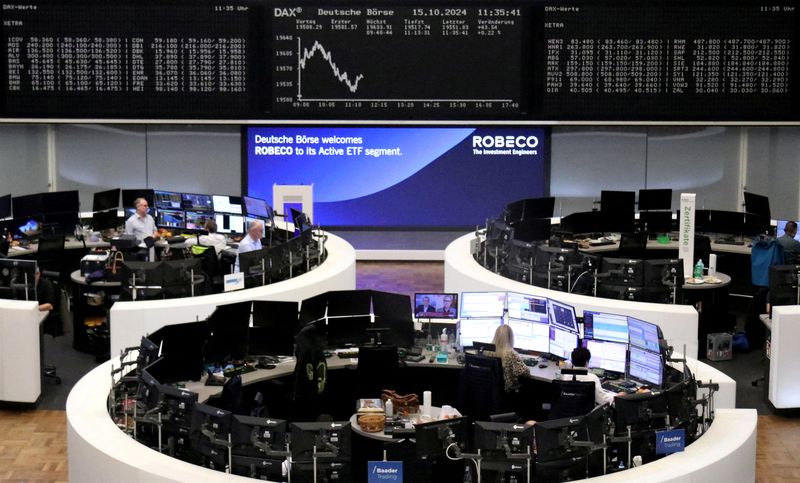SINGAPORE/LONDON (Reuters) – The euro was pinned at an 11-week low on Thursday ahead of an expected rate cut by the ECB, while European shares inched up, balancing gains on Wall Street with declines in Asia, where a housing policy briefing in China underwhelmed.
The European Central Bank is expected to make its first back-to-back rate cut in 13 years, and with markets pricing another cut in December, the tone and guidance in the press conference at 1245 GMT will be closely watched, even though some analysts do not always find President Christine Lagarde’s remarks helpful.
“Lagarde is a poor leading indicator – at the last meeting she nearly made me give up on the idea of a cut at this meeting until we got those PMIs,” said Jordan Rochester head of fixed income and currency strategy at Mizuho EMEA.
Weak purchasing manager index survey data for September was a major contributor in markets adding to bets on a rate cut at this meeting, seen as unlikely a month ago.
Those shifting expectations have been one factor in the recent decline in the euro, which was last down 0.1% at $1.0851 its lowest since 2 Aug. Germany’s 10-year Bund yield, the euro zone benchmark, was 3 basis points higher at 2.21%, but hit a two week low the previous day. [GVD/EUR]
“I expect continued bad news for growth and inflation and the terminal rate to be 1.5% next year, lower than priced – we don’t need to get to neutral with this data, we need to be loose,” said Rochester.
He said he thought the euro would likely grind lower to $1.08 into the U.S. election given the build-up of Trump hedges.
The election remains on a knife edge and Donald Trump’s tariff, tax and immigration policies are seen as inflationary, and thus negative for bonds and positive for the dollar, the latter at an over two month high on major peers. [FRX/]
The U.S. 10-year Treasury yield was last up 3 bps at 4.042%. [US/]
In share markets, Europe’s broad Stoxx 600 was last up 0.3%, as number of well-received earning updates helped the index to bounce back following a poor start to the week on disappointment over results from heavyweights ASML (AS:ASML) and LVMH. (EU)
The impact of ASML’s earnings in particular were also tempered by results from Taiwanese chipmaking giant TSMC which beat market expectations, and said it expects revenue to rise sharply in the fourth quarter.
That helped Nasdaq futures outperform, they were up 0.6% outpacing a 0.3% gain in S&P 500 futures.
The S&P 500 closed a whisker away from another closing record high on Wednesday. [.N]
CHINA REAL ESTATE
Earlier on Thursday, Japan’s Nikkei slipped 0.7% and China’s Shanghai Composite rose 0.1% and is now trading more than 10% below last week’s 33-month high.
Chinese real estate stocks fell 7%, reversing two days of gains. Hong Kong’s Hang Seng was last up 0.5% but sitting 12% below its most recent peak, as investors move aside to wait for more Chinese government spending and signs it is helping the economy. [.SS]
China’s housing minister on Thursday promised to improve builders’ access to funding for finishing thousands of projects.
But there was no new gesture to excite markets about a meaningful revival for a sector where a crackdown on developers’ borrowing has set off a wave of defaults, while declining prices have shaken households’ faith in the asset class.
“The briefing is mainly about implementing previously-announced policies, including some already in operation,” said Shi Jiangwei, analyst at Shanghai Minority Asset Management, disappointing investors expecting fresh stimulus.
Australian shares also eased from a record high as mining stocks slipped and iron ore prices fell in Singapore.
That also weighed on the Australian dollar which struggled to hold its gains from data showing net employment blew past forecasts. [AUD/]

In commodity trading, Brent crude futures steadied at $74.48 a barrel after four sessions of losses. Industry data showed an unexpected drop in U.S. crude stockpiles last week. [O/R]
Gold last traded at $2,680 an ounce. [GOL/]
To read the full article, Click Here

